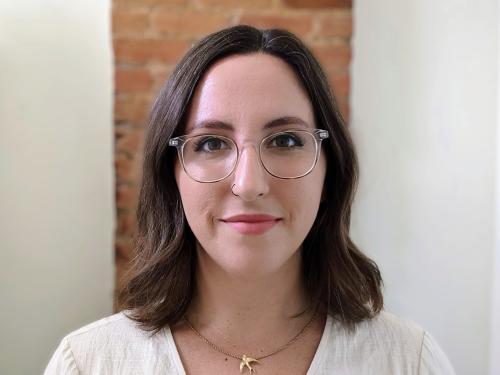A combined focus on maternal health, equity, and Latin America

For seven years at Tulane School of Public Health and Tropical Medicine, Annie Preaux has been building an impressive resume in maternal and child health, family planning, and issues related to health equity, particularly in Latin America.
As of Saturday, she’s wrapped up her education by graduating with a PhD in Global Community Health and Behavioral Sciences and receiving the prestigious Tulane 34 Award for demonstrating exemplary leadership, service, and academic excellence.
Preaux is also celebrating her achievements with both her husband and their two-month-old baby.
Her work in Latin America began as an undergrad at the University of Pittsburgh where she earned a bachelor’s degree in anthropology. While at U Pitt, Preaux established an enduring relationship with a field school in the Napo Province of Ecuador. As a graduate student at Tulane, she completed her practicum for her master’s in international health (MPH IHL, 2017) in Ecuador, working with linguists and filmmakers from two local universities to record life-history interviews with indigenous midwives who run a women's collective called AMUPAKIN supporting traditional births for Kichwa women from the surrounding communities.
The project also had a youth engagement component where young people related to the midwives were trained to operate the film equipment and edit film. “The younger generation often has less interest in learning about traditional practices, but they were excited to learn about the filmmaking equipment,” says Preaux. It was a win-win because they learned new skills and were engaged and excited to listen to and learn from their family members about traditional medical practices.
Preaux also spent time In Ciudad Juárez attending a workshop on border issues at the Universidad Autónoma de Ciudad Juarez and learning about community-based youth programs with the Red de Coaliciones Comunitarias and their effort to support communities experiencing high rates of crime and violence. During the 2019 wave of violence, Juárez had the highest murder rate in the world.
As a doctoral student, she worked with Dr. Arachu Castro on a project related to obstetric violence in the Dominican Republic interviewing obstetricians and other hospital personnel in three public hospitals to understand what they know about obstetric violence and mistreatment in general and why it occurs.
During the pandemic, Preaux worked with professors David Hotchkiss, Stacey Gage, and Josh Yukich to develop a report for UNICEF on COVID-19’s threat to progress against child marriage, which also led to a publication in the Journal of Adolescent Health.
Preaux and Castro returned to the Dominican Republic in 2023 and Preaux’s focus was on women's experiences with violence over different stages of their lives and how it relates to present experiences and interactions with their children, particularly their use of violent discipline with their children.
With graduation behind her, Preaux hopes to indulge in some well-earned rest and relaxation along with bonding with her baby, before she and her family move to Boone, NC. In August, Preaux will begin begins a tenure-track assistant professor position in public health at Appalachian State University, where she hopes to continue her research in Latin America and the Caribbean and start a summer study abroad program in Ecuador for students interested in public health and medical anthropology.
